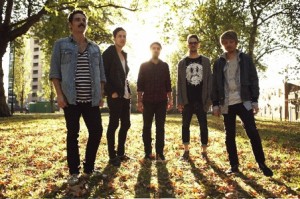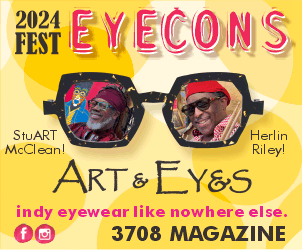 Success has come quickly to the Los Angeles-based indie rock band the Local Natives, but not as quickly as it may seem at first glance. Although the band released its debut album, Gorilla Manor, on February 16 of this year in the US, the five-piece group has been playing together, in some shape or form, for five years. Keyboardist Kelcey Ayer and guitarists Taylor Rice and Ryan Hahn began playing together while attending high school in Orange County. A year later, they were joined by bass player Andy Hamm and drummer Matt Frazier. Formerly known as Cavil at Rest, the band changed its name in 2008 and took a new approach to making music. “We started to record the album and decided that a new name was in order, so that’s when we changed the name to Local Natives, started to put 110% into the band, and really started making this work,” explains Matt Frazier, who took time to talk to OffBeat about creating Gorilla Manor, living with his band mates, and life on the road.
Success has come quickly to the Los Angeles-based indie rock band the Local Natives, but not as quickly as it may seem at first glance. Although the band released its debut album, Gorilla Manor, on February 16 of this year in the US, the five-piece group has been playing together, in some shape or form, for five years. Keyboardist Kelcey Ayer and guitarists Taylor Rice and Ryan Hahn began playing together while attending high school in Orange County. A year later, they were joined by bass player Andy Hamm and drummer Matt Frazier. Formerly known as Cavil at Rest, the band changed its name in 2008 and took a new approach to making music. “We started to record the album and decided that a new name was in order, so that’s when we changed the name to Local Natives, started to put 110% into the band, and really started making this work,” explains Matt Frazier, who took time to talk to OffBeat about creating Gorilla Manor, living with his band mates, and life on the road.
Was the music that you were putting out as Cavil at Rest different from the music you’re making as the Local Natives?
Yeah, it was definitely different. It was a bit more, for lack of a better word, immature. It wasn’t quite as cohesive as it is now, especially when I joined and we started working together as five guys. It took us a couple of years to really figure out how to write together, how to work together as a band, and what sound we were going for. Once that clicked, we had this group of 13 or 14 songs, and we decided that we finally had something cohesive on our hands. That was like a turning point, where we were like, ‘Maybe a new name would be the best idea.’ It was definitely a little different than what it is now.
What was the thinking behind the name Local Natives?
It was probably one of the hardest decisions we’ve had to make. We had already been a band for so long, and changing the name is kind of a big deal. We bounced around names for a while and nothing really stuck. Everything kind of got kicked to the curb. With the way that the band was operating, and is now operating, it’s very much a collaborative effort. It’s like a community of five musicians, who are the best of friends. I think that the name Local Natives is playfully redundant, and I think it conjures up images that embody the nature of this band. It was one of those things where nobody really shot it down, but we were kind of like, “Huh, yeah, I could see that.” We felt like it fit the nature of the band very well.
You named your album Gorilla Manor after the house that the band lived in together. Can you tell me about that experience?
That was the whole time period when we had come together with the album and we had started recording. When we decided to change the name to Local Natives was right around the time that we moved in together. It was such a transformative time for us because we were surrounded by each other all the time and we were able to be super productive, and just write for like 12 hours a day, or work on artwork. It really taught us how to operate as a band. I feel like before then, we were kind of like a band in training. We were still trying to figure it out. Being around each other so much really helped us. I feel like it prepared us for the mass amount of touring that we’re doing now because we were in such close quarters. Some of us were sharing rooms. I think it would have been much different if we hadn’t lived together before we started recording.
I actually consider Gorilla Manor two locations because we did a large chunk of the album and wrote and recorded most of it when we were living in that initial house in Orange County in 2008. We had this somewhat finished product of the album, and we sat on it for a while, trying to figure out what we were going to do with it. This was before we were signed, before we had management or anything. We were feeling it out, and the following year is when we decided to move to Silver Lake. We moved to Silver Lake, and moved into a new house together and we actually wrote three more songs up in that Silver Lake house and recorded them in that area. Gorilla Manor for me is almost more of like a time period, those two years when we were living in those two different houses.
What were the three songs that you added in Silver Lake?
“Wide Eyes,” “Shape Shifter” and “Sticky Thread.” We had these ideas bouncing around and they ended up coming to fruition really quickly. And we were like, “These are actually really great songs. We’re really excited about them and we need to add them to the album.” I’m actually really glad that we did add them to the album because I feel like it gave it a whole new life.
Let’s talk about your collaborative approach to making music. Can you break it down and tell me how that works?
You have a lot of bands that have one or two main people who are the songwriters, and kind of like the lead. They’re like the masterminds behind the band. With us, it’s very different. Everyone is very much an equal part of this band, and we all write together. Each song is kind of a different process. Some songs, maybe one or two people will originate and bring to the band. Another song, maybe all five of us work on it together. There are no boundaries. When it comes to writing, it’s a case-by-case basis. With it being so collaborative – and it’s a very democratic, new process – things do tend to be a little more drawn out, a little more tedious, because instead of one person controlling it, it’s five of us in a room, trying to come together on something. But I think the beauty of it for me is at the end of the day when the song is finished, or our work is finished, it’s never something that just one of us could have produced. It’s always something very different than what one person could have done.
Upon the immediate release of Gorilla Manor, the Local Natives started creating major buzz in the indie music scene, and were simultaneously compared to bands such as Animal Collective, Fleet Foxes, Arcade Fire and Grizzly Bear. How do you respond to the media instantly comparing you to existing bands rather than letting you create your own identity?
I think we’re slowly getting used to it now. It’s expected. A new band comes out of nowhere, to most people, and they need something to compare it to. They need some kind of reference point to dive in to this new music. To be honest, when we first started getting compared to a lot of these bands, in a way it was really flattering, because those are all really great bands that we really respect and we love. But at the same time, it was a little nerve-racking because the last thing any of us would want is to be lumped into, ‘Oh there’s this new band, and they’re just like a Grizzly Bear rip-off,” or “They’re just like the next Arcade Fire.” We want to be known for doing something unique, something that is our own. I think now that the record’s been out for a bit and people are seeing the live shows, there has been no backlash. I think it’s been a positive thing and people are seeing that we have our own take on this style of music, and that we are doing something unique and something new.
Since the release of your album you’ve maintained a very rigorous touring schedule both in the US and overseas. How is life on the road treating you?
It’s going well. It’s definitely a learning process. It’s slowly become more and more frequent. I think we’ve been home in L.A. collectively maybe three weeks in the past year and a half. We’re figuring out how to balance time and work together while taking some alone time when you can get it – it is a rarity. We’re still new at this, it’s still exciting to see. Touring overseas is one thing that we thought ‘maybe someday down the line,’ like a few years from now, maybe we’ll get to go over there. We never thought it would happen so soon, and that the response would be as good as it is. It’s just really exciting to see it grow, not only in the US, but in Europe and the UK. It’s been pretty amazing.
The Local Natives play a free show on Tulane’s LBC Quad tonight at 6 p.m. The Ruby Suns and The Union Line open.




